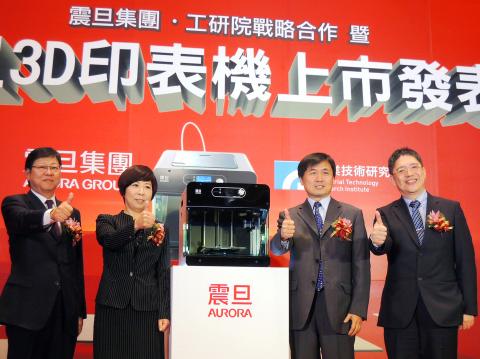Office appliance sales agent Aurora Group (震旦) is aiming to sell its own-brand 3D printers to 200,000 Taiwanese small and medium-sized enterprises, or nearly one-seventh of the total, next year.
The “F1” 3D printer is designed by Aurora and manufactured by automation equipment maker Contrel Technology Co (東捷) using the Industrial Technology Research Institute’s (ITRI) technologies, Aurora said yesterday.
Set to hit the market next month, the F1 3D printer is priced at about NT$100,000 (US$3,400), Tony Tsai (蔡坤明), senior manager of Aurora’s 3D printing business department, said at a product launch event.

Photo: Yang Ya-min, Taipei Times
The price is much higher than the 3D printer made by local electronics conglomerate New Kinpo Group (新金寶集團), which in August said it would begin selling its “da Vinci” printer at NT$15,000 starting this month.
Asked to elaborate Aurora’s advantages in selling higher-priced 3D printers against New Kinpo, Tsai said: “It’s all about the price-performance ratio.”
The F1 also features a user-friendly interfaces to its new product and the firm provides year-long customer service, he added.
Aurora distributes printers for Sharp Corp and Hewlett-Packard Co (HP) in Taiwan and sells Stratasys Ltd’s 3D printers in China. The company also markets office furniture, appliances and supplies.
The company will continue using a business-to-business (B2B) model, rather than a business-to-consumer (B2C) one, to sell its 3D printer, Tsai said.
In a report released in October, market researcher Gartner Inc forecast worldwide shipments of 3D printers that are priced at less than US$100,000 would grow 49 percent to 56,507 units this year.
The figure is estimated to increase 75 percent to 98,065 units next year and rise another 100 percent to about 196,130 units in 2015, Gartner said.
“The 3D printer market is a brand-new market, and we are confident we will hold a notable market share in the long run,” Aurora executive director Alice Lin (林樂萍) said.
After Taiwan, Aurora plans to break into China and then to other overseas markets, Lin said.
To keep up with market trends, Aurora also plans to introduce its own “Aurora Office Cloud” to consumers as soon as the third quarter of next year.
The new could technology service will allow customers to upload and download files to be printed, it said.

SETBACK: Apple’s India iPhone push has been disrupted after Foxconn recalled hundreds of Chinese engineers, amid Beijing’s attempts to curb tech transfers Apple Inc assembly partner Hon Hai Precision Industry Co (鴻海精密), also known internationally as Foxconn Technology Group (富士康科技集團), has recalled about 300 Chinese engineers from a factory in India, the latest setback for the iPhone maker’s push to rapidly expand in the country. The extraction of Chinese workers from the factory of Yuzhan Technology (India) Private Ltd, a Hon Hai component unit, in southern Tamil Nadu state, is the second such move in a few months. The company has started flying in Taiwanese engineers to replace staff leaving, people familiar with the matter said, asking not to be named, as the

The prices of gasoline and diesel at domestic fuel stations are to rise NT$0.1 and NT$0.4 per liter this week respectively, after international crude oil prices rose last week, CPC Corp, Taiwan (台灣中油) and Formosa Petrochemical Corp (台塑石化) announced yesterday. Effective today, gasoline prices at CPC and Formosa stations are to rise to NT$27.3, NT$28.8 and NT$30.8 per liter for 92, 95 and 98-octane unleaded gasoline respectively, the companies said in separate statements. The price of premium diesel is to rise to NT$26.2 per liter at CPC stations and NT$26 at Formosa pumps, they said. The announcements came after international crude oil prices

DOLLAR SIGNS: The central bank rejected claims that the NT dollar had appreciated 10 percentage points more than the yen or the won against the greenback The New Taiwan dollar yesterday fell for a sixth day to its weakest level in three months, driven by equity-related outflows and reactions to an economics official’s exchange rate remarks. The NT dollar slid NT$0.197, or 0.65 percent, to close at NT$30.505 per US dollar, central bank data showed. The local currency has depreciated 1.97 percent so far this month, ranking as the weakest performer among Asian currencies. Dealers attributed the retreat to foreign investors wiring capital gains and dividends abroad after taking profit in local shares. They also pointed to reports that Washington might consider taking equity stakes in chipmakers, including Taiwan Semiconductor

A German company is putting used electric vehicle batteries to new use by stacking them into fridge-size units that homes and businesses can use to store their excess solar and wind energy. This week, the company Voltfang — which means “catching volts” — opened its first industrial site in Aachen, Germany, near the Belgian and Dutch borders. With about 100 staff, Voltfang says it is the biggest facility of its kind in Europe in the budding sector of refurbishing lithium-ion batteries. Its CEO David Oudsandji hopes it would help Europe’s biggest economy ween itself off fossil fuels and increasingly rely on climate-friendly renewables. While